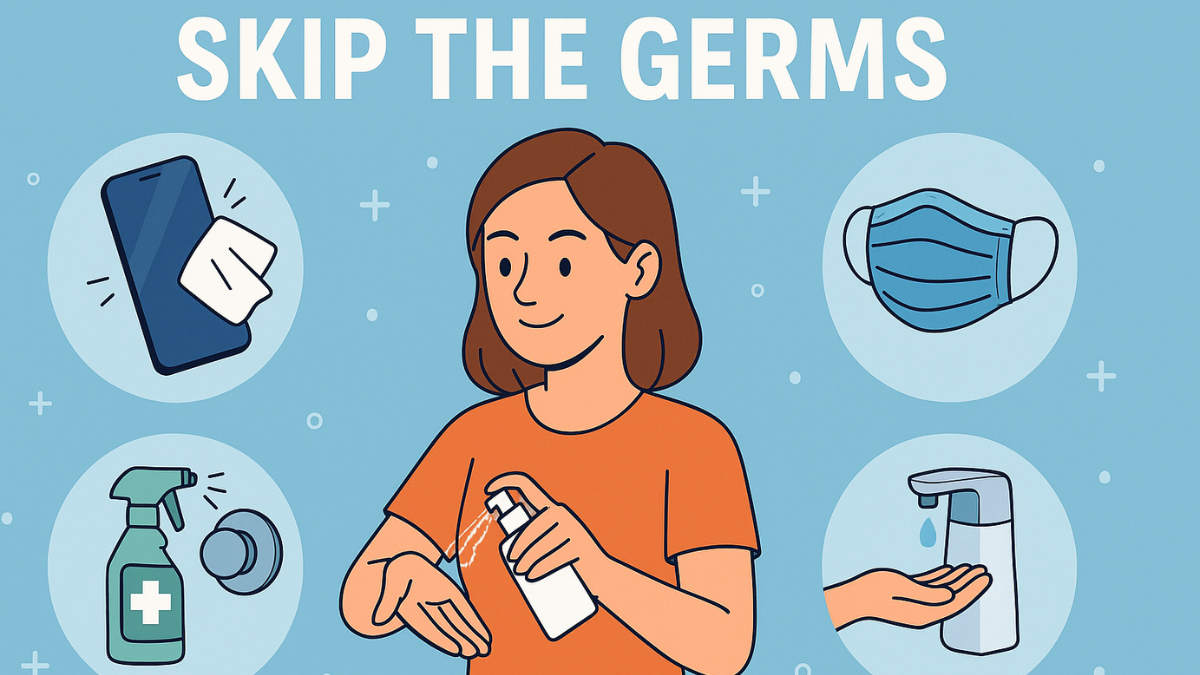In today’s world, germs are everywhere—from your phone and keyboard to doorknobs and public transportation. While some germs are harmless or even beneficial, others can cause serious illnesses. Understanding how to skip the germs is not about living in a bubble but about developing conscious habits that prevent unnecessary exposure and transmission. This guide dives deep into practical, research-based hygiene routines and lifestyle changes to help you avoid common sources of harmful bacteria and viruses in your daily life.
also read: https://usaenliinea.com/florence-elsie-ellis/
Understanding Germs and Their Impact
Germs include microscopic organisms like bacteria, viruses, fungi, and protozoa. They exist naturally in the environment and can live on surfaces, in the air, and even on our bodies. While many microbes are essential for human health (such as gut bacteria), others can lead to infections, colds, flu, and even life-threatening diseases.
The most common ways people get sick from germs are:
- Direct contact with infected individuals
- Touching contaminated surfaces
- Consuming contaminated food or water
- Poor personal hygiene
When we say “skip the germs,” we mean taking intentional steps to break these transmission pathways.
Why Skipping the Germs Matters More Than Ever
In the post-pandemic world, germ avoidance is not just a trend—it’s a lifestyle necessity. Viruses like COVID-19, influenza, and norovirus can spread rapidly through shared spaces and human contact. Preventing infection not only protects your health but also reduces the strain on healthcare systems and keeps workplaces and schools running smoothly.
Skipping germs helps in:
- Reducing sick days and medical bills
- Minimizing the risk of chronic infections
- Boosting immune resilience
- Promoting overall hygiene in households and communities
Daily Habits to Help You Skip the Germs
To skip the germs effectively, it’s essential to incorporate smart hygiene practices into your daily routine. These don’t need to be complicated—they just need to be consistent.
1. Hand Hygiene: Your First Line of Defense
Washing your hands with soap and water is one of the most effective ways to eliminate germs. According to the CDC, proper handwashing can reduce respiratory illnesses by 16–21%.
You should wash your hands:
- Before eating or preparing food
- After using the restroom
- After coughing, sneezing, or blowing your nose
- After touching animals or animal waste
- After being in public places
Use hand sanitizer with at least 60% alcohol when soap and water are not available.
2. Surface Disinfection: Keeping High-Touch Areas Clean
Many viruses and bacteria can survive on surfaces for hours or even days. Regularly disinfect surfaces like:
- Doorknobs
- Light switches
- Mobile phones
- Computer keyboards
- Remote controls
Use EPA-approved disinfectants or DIY options like diluted bleach (1/3 cup bleach per gallon of water).
3. Skip the Germs While Traveling
Public spaces like buses, planes, and taxis are breeding grounds for bacteria. To avoid germs while on the move:
- Carry disinfecting wipes for armrests and tray tables
- Avoid touching your face
- Use touchless payment methods
- Sanitize your hands before eating or drinking
Wearing a mask in crowded places can still offer protection from respiratory germs.
Skip the Germs at Work and School
Shared workspaces and classrooms can facilitate rapid germ spread. Here’s how to stay safe:
- Keep personal items like phones and pens to yourself
- Wipe down shared equipment before use
- Avoid touching communal surfaces like elevator buttons with bare hands
- Stay home if you feel sick to prevent infecting others
Employers and educators should also encourage routine cleaning and provide sanitizing supplies.
Personal Items That Can Be Germ Magnets
Many items we use daily can host thousands of microbes. Some of the most contaminated personal belongings include:
| Item | Average Germ Count | Cleaning Frequency |
|---|---|---|
| Smartphone | Over 25,000/ sq in | Daily |
| Toothbrush holder | 2nd germiest spot | Weekly |
| Purse/Handbag | 10,000+/ sq in | Weekly |
| Keyboard/Mouse | More than toilet | Twice a week |
| Reusable Water Bottle | High bacterial growth | After every use |
Keeping these items clean can significantly help you skip the germs on a micro level.
Food Safety: Skipping the Germs in the Kitchen
Foodborne illnesses are often caused by cross-contamination or improper food handling. Key kitchen hygiene tips include:
- Wash fruits and vegetables under running water
- Avoid using the same cutting board for meat and vegetables
- Cook food to the right internal temperature (e.g., poultry to 165°F / 74°C)
- Refrigerate leftovers within two hours
Proper food storage and prep can reduce the risk of salmonella, E. coli, and other pathogens.
How to Skip the Germs at Home
Home should be your safe zone, but germs can still infiltrate if hygiene isn’t prioritized. Tips for maintaining a germ-free home:
- Take shoes off before entering
- Clean kitchen sponges and dishcloths often
- Wash bedding weekly in hot water
- Use air purifiers to reduce airborne bacteria and allergens
Pets should be groomed regularly, and litter areas should be cleaned daily to avoid spreading zoonotic germs.
Kids and Germ Education: Start Them Young
Teaching children to skip the germs at an early age instills lifelong healthy habits. Make hygiene fun through:
- Handwashing songs
- Color-changing soap for visual learning
- Reward systems for good habits
- Supervised cleaning routines
Daycares and schools should incorporate hygiene education and provide hand sanitizer stations.
Immune-Boosting Lifestyle Choices
Skipping the germs is not just about cleaning—it’s also about fortifying your immune system so it can fight off infections more effectively. Consider these healthy habits:
- Eat a balanced diet rich in antioxidants
- Get 7–9 hours of sleep per night
- Engage in moderate exercise
- Manage stress through mindfulness or meditation
- Stay hydrated throughout the day
The stronger your immunity, the easier it is to resist the germs you can’t skip entirely.
Technological Tools to Help You Skip the Germs
Smart technology can assist in maintaining a germ-free environment:
| Device | Function |
|---|---|
| UV sanitizing box | Disinfects phones, keys, accessories |
| Automatic soap dispenser | Promotes touchless handwashing |
| HEPA air purifier | Traps bacteria and allergens in the air |
| Voice-activated assistants | Minimizes contact with contaminated surfaces |
Investing in such devices offers extra layers of protection for families and workplaces.
FAQs About Skipping the Germs
1. Can skipping germs weaken my immune system in the long term?
No, practicing good hygiene doesn’t weaken your immune system. It prevents illness without affecting your body’s ability to fight off infections.
2. How long do most germs survive on surfaces?
It depends. Flu viruses may survive on hard surfaces for 24–48 hours, while some bacteria can persist for days.
3. Do cloth masks help skip germs in non-COVID times?
Yes, they still offer protection against pollution, allergens, and other respiratory illnesses when worn in crowded places.
4. Is hand sanitizer as effective as soap and water?
Soap and water are better at removing certain types of germs. Use sanitizer only when handwashing isn’t possible.
5. Should I avoid hand dryers in public restrooms?
Yes, many studies suggest hand dryers can spread bacteria in the air. Paper towels are more hygienic.
6. Can essential oils be used to disinfect surfaces naturally?
Some, like tea tree oil and eucalyptus, have antimicrobial properties but may not be as effective as EPA-approved disinfectants.
7. Is it safe to use public restrooms?
Yes, with proper precautions like handwashing and avoiding direct contact with surfaces, public restrooms are generally safe.
8. How often should I wash reusable masks or face coverings?
Ideally, after every use. If not possible, at least daily or when visibly dirty.
9. Can I skip germs in a gym environment?
Yes, by wiping equipment before and after use, showering afterward, and avoiding shared towels or bottles.
10. Do antimicrobial phone cases work?
They may reduce bacterial growth on the case, but routine cleaning is still necessary for hygiene.
Conclusion: Skipping Germs Is a Lifestyle, Not a Limitation
Learning how to skip the germs doesn’t mean living in fear—it means living smarter. By adopting practical hygiene habits, making conscious lifestyle choices, and leveraging technology, you can significantly reduce your exposure to harmful microbes. Whether at home, work, school, or on the go, staying one step ahead of germs can improve your quality of life and long-term health.
Stay consistent, stay clean, and skip the germs with intention.
also read: https://usaenliinea.com/shani-levni/
also read: https://usaenliinea.com/ttps-docs-google-com-document-pii-deleted/
also read: https://usaenliinea.com/understanding-the-pragmatic-juara100-org-medal-system/
also read: https://usaenliinea.com/thalamovies-com-a-complete-guide-to-the-emerging-movie-streaming-site/
also read: https://usaenliinea.com/uvlack-the-ultimate-solution-for-uv-protection-and-skincare/
also read: https://usaenliinea.com/rwu-uar/
also read: https://usaenliinea.com/veganovies-com-a-comprehensive-guide-to-vegan-streaming-and-entertainment/
also read: https://usaenliinea.com/gessolini/







